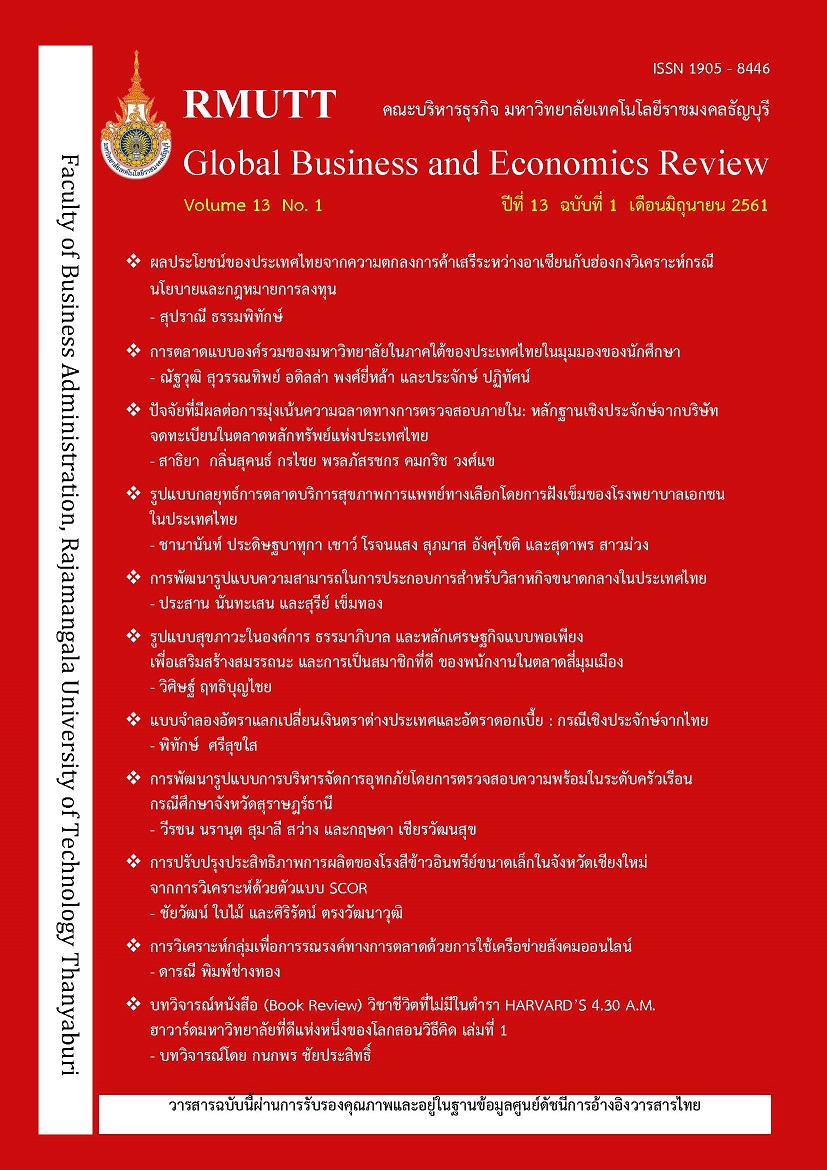STUDENTS’ PERCEPTIONS OF HOLISTIC MARKETING OF THE UNIVERSITIES IN THE SOUTHERN PART OF THAILAND
Keywords:
Holistic Marketing, Internal Marketing, Integrated Marketing, Relationship Marketing, Performance MarketingAbstract
This research aimed to study students' perceptions of the holistic marketing factors of 13 universities in the southern part of Thailand. The questionnaire was created and reviewed by 5 experts. Data were collected from 400 participants between May 2017 and June 2017. The research methodology was the application of cognitive marketing concepts that included 4 elements: Corporate Marketing, Integrated Marketing, Marketing Relationships, and Marketing Practices. Mean and standard deviation were used to analyze the students’ opinions as well as Exploratory Factor Analysis (EFA) by Principal Component Analysis (PCF) through Orthogonal Factor Rotation by Varimax method using 25 rounds of extraction. The results show that the students agreed that the university had the greatest effect e.g. booth, roadshow to guide the students directly. However, the factor that students agreed with the least was courses available for all ages. This study has 7 new elements. Students gave importance to integrated marketing issues. The results can be used as strategic guidelines for a university's strategy.
References
วิทวัส สัตยารักษ์. (2552). กลยุทธ์การสร้างแบรนด์มหาวิทยาลัยเอกชน. กรุงเทพฯ: บัณฑิตวิทยาลัย มหาวิทยาลัยศรีนครินทรวโรฒ.
วรรณี งามขจรกุลกิจ. (2550) การศึกษารูปแบบและลักษณะของพันธกิจความรับผิดชอบต่อสังคมที่พึงประสงค์ เพื่อสนับสนุนแบรนด์มหาวิทยาลัยเอกชน. กรุงเทพฯ: คณะนิเทศศาสตร์ มหาวิทยาลัย ศรีปทุม.
สำนักงานคณะกรรมการอุดมศึกษา. (2559). ข้อมูลสถิติการศึกษา. สืบค้นจาก www.mua.go.th.
Al-Hawary, S.I., Al-Qudah, A.K., Abutayeh, M.P., Abutayeh, M.S. & Al Zyadat, D.Y. (2013). The Impact of Internal Marketing on Employee’ s Job Satisfaction of Commercial Banks in Jordan Interdisciplinary. Journal of Contemporary Research In Business, 1(1), 1-17.
Anderson, J. C. & Narus, J. A. (1990). A Model of Distributor Firm and Manufacturer Firm Working Partnerships, Journal of Marketing, 54(1), 42-58.
Anderson, E. & Weitz, B. (1989). Determinants of Continuity in Conventional Industrial Channel Dyads. Marketing Science, 8, 310-323.
Anosike, P.U. & Ahmed, P. (2006). Internal marketing: perceptions from theory and practice (pp. 41-49). United Kingdom, UK: university of Wolverhampton.
Ballantyne, D. (2000). The strengths and weaknesses of internal marketing in Varey, R. & Lewis, B. (pp. 274-286). London: Internal Marketig, Directions for Management.
Berry, L.L. & Parasuraman, A. (1991). Marketing services, competing through quality. (pp. 74-86). New York, NY: The Free Press.
Duncan, T. R. & Mulhern, F. (2004). A White Paper on the Status, Scope and Future of IMC. IMC Symposium sponsored by the IMC programs at Northwestern University and University of Denver. (pp. 86-88). United States of America, USA: McGraw-Hill.
Duncan, Tom. (2002). IMC: Using Advertising & Promotion to Build Brands. (pp. 72). New York, NY: McGraw-Hill.
Gray, B.J., Fam, K.S. & Llanes, V.A. (2003). Branding universities in Asian markets. Journal of Product and Brand Management 12(2), 108-120.
Gronroos, C. (1981). Internal marketing- an integral part of marketing theory. In Donnelly, J.H. and George, W.R. (Eds), Marketing of Services. (pp. 236-238), Chicago: American Marketing Association.
Hougaard, S., & Bjerre, M. (2003). Strategic Relationship Marketing. Heidelberg, Germany: Springer-Verlag.
Kotler, P. (2003). A Framework for Marketing Management, Prentice-Hall, Inc, New Jersey: A Pearson Education Company Upper Saddle River.
Kotler, P., & Keller, K. L. (2015). Marketing management (pp. 6-9), New Jersey: Prentice Hall.
Kotler, P., Roberto, N., & Lee, N. (2002). Social marketing: Improving the quality of life. (pp. 33-39), Thousand Oaks: Sage Publications.
MacLaverty, N., McQuillan P., & Oddie, H. (2007). Internal Branding Best Practices Study. (pp. 40-49 ), Canada: Canadian Marketing Association.
Mazzarol, T. (1998). Success Factors for International Education Marketing. International Journal of Educational Management, 2, 163-175.
Sasser, E.W., & Arbeit, S.P. (1976). Selling Jobs in the Services Sector. Business Horizons, 19(3), 61-65.
Yamane, T. (1967). Statistics: An Introductory Analysis (2nd ed.). Newyork: Harper and Row Publication.
Downloads
Published
How to Cite
Issue
Section
License
The articles published in this journal are the intellectual property of their respective authors.
The views and opinions expressed in each article are solely those of the individual authors and do not reflect the positions of Rajamangala University of Technology Thanyaburi or any of its faculty members. All components and content of each article are the sole responsibility of the respective authors. In the event of any errors, the authors shall bear full responsibility for their own work.








